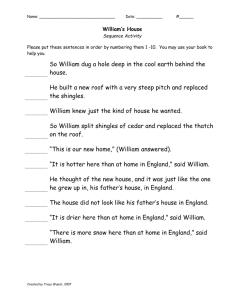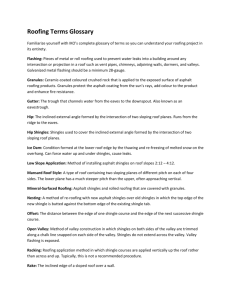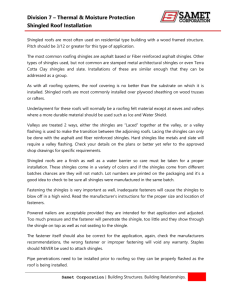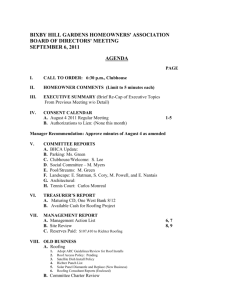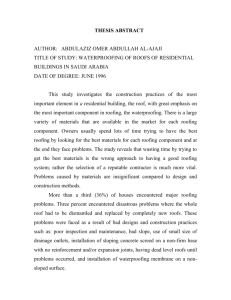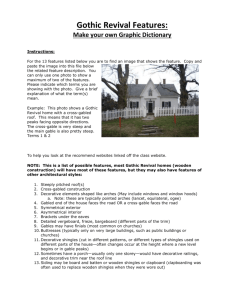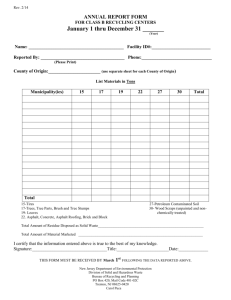B. Counter Flashing at porch roofs
advertisement
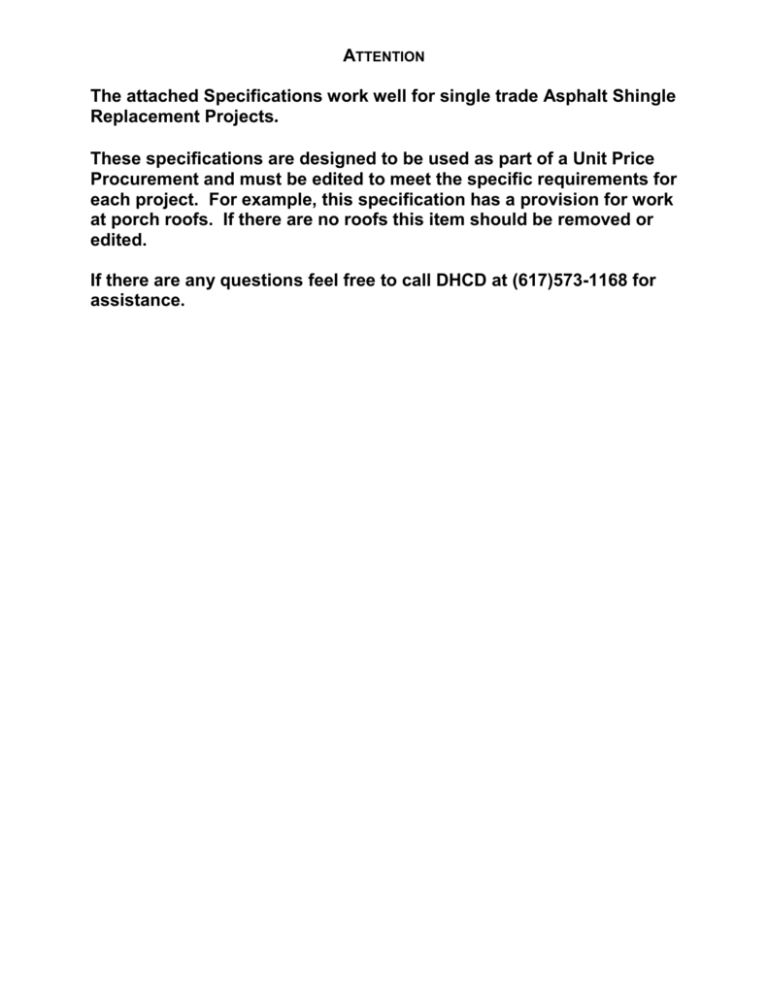
ATTENTION The attached Specifications work well for single trade Asphalt Shingle Replacement Projects. These specifications are designed to be used as part of a Unit Price Procurement and must be edited to meet the specific requirements for each project. For example, this specification has a provision for work at porch roofs. If there are no roofs this item should be removed or edited. If there are any questions feel free to call DHCD at (617)573-1168 for assistance. SECTION 02 06 00 DEMOLITION PART 1 - GENERAL 1.00 GENERAL REQUIREMENTS The general provisions of the Contract, including General Conditions and Division 1 Specification Sections apply to this Section. 1.01 SCOPE OF WORK A. Strip off all of the existing roof shingles, nails, felt or membrane underlayment, metal drip edge, existing ridge vents and other flashing on all buildings listed in the Summary of Work and legally dispose of all debris. Verify that the existing sheathing is in good condition, identifying for examination by the Architect all areas that show evidence of damaged sheathing. Should there be areas of sheathing or framing deterioration as determined by direct examination and in consultation with the Architect these areas will be replaced at a price listed in the schedule of Unit Prices. B. Gutters and downspouts are to be protected and returned to operating condition at the end of the Work. The Contractor will be required to replace any gutters or downspouts damaged during the project. Replacement gutters and downspouts shall be new. C. Patching and Repairs- Perform all necessary patching and repairs to the items scheduled to remain. 1.02 QUALITY ASSURANCE A. Requirements of Regulatory Agencies: Perform demolition work in accordance with applicable rules, regulations, codes, and ordinances of local, state and federal authorities, and in accordance with the requirements of public utility corporations having jurisdiction over the work. B. Obtain and pay for necessary permits, licenses and certificates and give notices as required during the performance of the demolition work. PART 3 - EXECUTION 3.01 PREPARATION AND PROTECTION A. This Family/Elderly development will be occupied at all times during this contract. B. Provide, erect and maintain catch platforms, lights, barriers, weather protection, warning signs and other items as required for the protection of the workers engaged in demolition operations, public, adjacent construction and occupants of the building. C. Provide fire protection in accordance with local fire department requirements. D. Do not close or obstruct streets or sidewalks without the proper permit. Conduct operations with minimum traffic interference. E. Buildings/Apartments shall have at least one unobstructed means of egress at all times. The contract shall sequence the Work to insure this at all times. Roofs Demolition 1 of 2 02 06 00 F. Protect public and private property adjacent to and on the job site, including landscaping, vents, utility lines, streets, sidewalks, light standards, hydrants, street signs, mail boxes and fire alarm boxes. Make repairs to the complete satisfaction of the owner of the damaged property. G. Make such explorations and probes as are necessary to ascertain any required protective measures before proceeding with demolition and removal work. H. Provide and maintain temporary protection of the existing structure designated to remain where demolition and removal work is being done, connections made, materials handled or equipment moved, including but not limited protecting areas where roofing has been re-moved and new work has not be made the existing weather tight. 3.02 DEMOLITION A. Perform demolition and removal work as indicated. B. Remove from the Owner's property and legally dispose of materials or items demolished and not designated to become the property of the Owner. C. The Development will be occupied by Residents at all times during this contract. Execute the work in a careful and orderly manner, with the least possible disturbances to the public. D. The Contractor shall have at least one person in charge of operations on the ground below shingle and other roof material removal operations. This person shall be cognizant of residents and other persons in the work area and shall remove debris that may obstruct passage or otherwise present a danger to residents. END OF SECTION Roofs Demolition 2 of 2 02 06 00 SECTION 06 10 00 CARPENTRY PART 1 - GENERAL 1.00 GENERAL REQUIREMENTS Drawings and general provisions of the Contract, including General Conditions and Division 1 Specification Sections apply to this Section. 1.01 SCOPE OF WORK A. Fasten existing sheathing to insure substrate meets the shingle manufacturer’s requirements and that it is fastened in accordance with the requirements of the most recent version of the Massachusetts State Building Code. B. Verify that the existing sheathing is in good condition, identifying for examination by the Architect all areas that show evidence of damaged sheathing. Should there be areas of sheathing or framing deterioration as determined by direct examination and in consultation with the Architect replace sheathing or framing based on the price listed in the schedule of Unit Prices. 1.02 REFERENCES Where the Specifications refer to a specific standard, other authoritative standards which ensure an equal or higher quality than the standards mentioned will also be acceptable. 1.03 STANDARDS All material and workmanship shall be in accordance with the latest issue of the applicable standards of the U.S. Department of Commerce, Voluntary Product Standards (PS), American Wood-Preservers' Association (AWPA) for quality standard for each type of woodwork and quality grade indicated. 1.04 PRODUCT HANDLING Keep rough carpentry material and work dry during delivery, storage and installation, until finish is applied and building is enclosed. Provide for air circulation in stacks of lumber and plywood. 1.05 UNIT PRICES Refer to Section 01.22.00 -- Unit Prices where scope and description of unit prices to the Contract requirements are given. Carpentry 1 of 3 06 10 00 PART 2 - PRODUCTS 2.01 LUMBER: A. Lumber Size: - Provide dressed or worked and dressed lumber, as applicable, manufactured to the actual sizes and pattern to match the existing lumber to be replaced, unless otherwise indicated. B. Moisture Content - Softwood Lumber: Provide kiln dried lumber having a moisture content from time of manufacture until time of installation not greater than values required by the applicable grading rules of the respective grading and inspection agency for the species and product indicated. C. Lumber - Painted Finish: Use pieces which are made of solid lumber stock. D. Lumber Species: Use same species and grade of lumber for same items throughout work, do not mix different species or grade. 2.02 PLYWOOD A. Sheathing: Exterior Type, Standard Grade with exterior glue; Douglas Fir, 5 ply thickness to match the existing sheathing. Note: 4 ply, southern yellow pine plywood is not acceptable. B. Plywood Grading: Comply with Product Standard PS 1, "Construction and Industrial Plywood". C. Certification and Marking: The producer shall include a Certificate of Inspection with each shipment. Grade mark each panel in compliance with applicable standards of Product Standard PS 1. D. Moisture Content: Provide plywood which has been seasoned by kiln drying to a moisture content not to exceed 19%. 2.03 ANCHORS, FASTENERS, AND PLATES A. Bolts, Replacement Plywood Clips, Nuts, Studs, Rivets: FS FF-B-575, FF-S-1362 and FF-R-556. B. Expansion Shields: FS FF-S-325; group, type, class and style best suited for the purpose. . Lag Screws and Bolts: FS FF-B-561; type and grade best suited for the purpose. D. Nails: FS FF-N-105; type and size best suited for the purpose. Hot dipped galvanized for exterior use. E. Toggle Bolts: FS FF-B-588; type and class best suited for the purpose. F. Wood Screws: FS FF-S-111; style best suited for the purpose. Hot dipped galvanized for exterior use. G. Steel Plates and Shapes: ASTM A36, galvanized for exterior use. H. Primer: Shop primer for ferrous metal; zinc chromate with a synthetic resin vehicle. Carpentry 2 of 3 06 10 00 PART 3 - EXECUTION 3.01 CONDITION OF SURFACE A. Examine substrates, adjoining construction, and conditions under which the work is to be installed. Notify the Owner of any deteriorated condition. Do not proceed with the work until unsatisfactory conditions detrimental to the proper and timely completion of the work have been corrected. B. Whenever rough carpentry is fitted to other work, obtain measurements of such other work, verify dimensions shown and the shop drawing details. 3.02 ROUGH FRAMING A. Frame to fit closely, and set accurately to required lines and levels; secure rigidly in place in accordance with details and best recommended industry practices. B. Use shims of slate or steel for leveling wood members on concrete or masonry. C. Cut and fit to accommodate other work as required and in a neat workmanlike manner. D. Set joists with crown edge up. E. Nail in accordance with National Forest Products Association publication “Manual for House Framing”, Table I - Recommended Nailing Schedule. F. Use no pieces of wood smaller than 30” in length. 3.03 BLOCKING AND NAILERS Provide blocking and nailers between framing members and at masonry, concrete or steel as shown or required for fastening of sheathing, roofing, roof accessories, or attachment of fixtures, equipment and other such items. 3.04 PLYWOOD SHEATHING REPLACEMENT A. Replacement sheathing shall be installed in accordance with the recommendations of the APA the Engineered Wood Association and the requirements of the most recent edition of the Massachusetts State Building Code. B. Panel Size: Replacement panels shall be a minimum of 12” wide and shall span a minimum of two rafter/truss bays C. Spacing: Perimeter space around new panels shall be a minimum of the diameter of a 10d common nail. D. Fasteners: Minimum 8d common nails spaced at least 6” o.c. at the support edges and 12” o.c. at intermediate supports. Fasteners shall be a minimum 3/8” from all panel edges. In high wind areas additional fasteners shall be installed if requested by the Architect E. All panels shall be properly oriented so that panel grain runs perpendicular to the supports. check trusses and rafters so that all new panels are install true and in a level plane. Shim Trusses and rafters as required to prevent bows, bellies or other out of plane installations. END OF SECTION Carpentry 3 of 3 06 10 00 SECTION 07 30 00 ASPHALT ROOFING SHINGLES PART 1 - GENERAL 1.00 GENERAL REQUIREMENTS The general provisions of the Contract, including General and Division 1 Specifications Sections apply to this Section. 1.01 SCOPE OF WORK A. The general scope of work consists of replacement of the asphalt shingle roofing system including but not limited to asphalt roof shingles, underlayment, rubberized membrane underlayment, aluminum drip edge, and other sheet metal flashings, ridge vents, starter strips, nails and other fasteners, and plastic cement and other items required for a complete watertight installation. B. Shingles, flashing and drip edge shall be completely removed and replaced on all roofs. C. Metal Drip edge shall be installed on all edges including rakes and eaves. D. Cut existing plywood roof sheathing and install new Ridge vent on all roofs. Contractor should include the cost for new ridge vents that will be required on all roofs. 1.02 QUALITY ASSURANCE A. Provide certificate of compliance from shingle manufacturer for ASTM and UL Standards, indicating conformance to Contract requirements. B. Maintain one (1) copy of manufacturer’s application instructions on site. C. All shingles shall have same Lot Number. 1.03 DELIVER, STORAGE AND HANDLING A. Deliver materials in manufacturer's unopened, labeled bundles, rolls or containers. B. Store materials to avoid water damage and store rolled goods on end. Comply with manufacturer's recommendations for job-site storage and protection. Roofs Asphalt Roofing Shingles 1 of 6 07 30 00 1 1.04 JOB CONDITIONS A. Substrate: Proceed with shingle work only after substrate construction and penetrating work have been completed. B. Weather Conditions: Proceed with shingle work only when weather conditions are in compliance with manufacturer's recommendations and when substrate is completely dry. C. ABSOLUTELY NO WORK WILL BE DONE IN THE RAIN.!! D. 1.05 NO SHINGLE WORK SHALL BE PERFORMED WHEN THE AIR TEMPERATURE IS BELOW 32 F!! SPECIFIED PRODUCT WARRANTY In addition to those Guarantees and Warrantees required by the General Conditions the Contractor shall provide: A. The manufacturer’s standard warranty shall be lifetime from date of substantial completion. B. The Contractor shall provide the Owner with a copy of the Bill of Sale for the Shingles clearly indicating the product, quantity, purchase date, and a note indicating the project for which the product is intended. C. Warranty Supplement - Shingle Manufacturer shall provide supplemental warranty covering labor and materials for a period of five (5) years from the date of substantial completion. D. Satisfactory delivery of warrantees shall be precedent to final payment. PART 2 2.01 PRODUCTS ASPHALT SHINGLES A. Double layer, fiberglass mat; ceramically colored/UV resistant mineral granules across entire face of shingle; 300 lb/square; color to be selected by Architect; complying with Applicable Standards ASTM D 3018, Type 1 ASTM D 3462 Tear Resistance ASTM E 108 Fire Resistance: Class A ASTM D 316 Wind Resistance: Type 1 UL 790 Fire Resistance: Class A UL 997 Wind Resistance: 70 mph NYC-MEA-120-79-M BOCA & SBCCI Building Code CSA Standard A123.5-M90 Algae Resistant Roofs Asphalt Roofing Shingles 2 of 6 07 30 00 2 B. Available Products: Subject to compliance with contract requirements, products which may be incorporated into the work include the following: 1. CertainTeed Landmark TL (Limited Lifetime Warranty) color selected by LHA. 2. GAF Ultra HD (Limited Lifetime Warranty) color selected by LHA. 3. Owings Corning TruDefinition Duration Shingles (Limited Lifetime Warranty) color selected by LHA. 4. Or equal approved by the Architect and Department in accordance with General Conditions. C. Contractor shall expect to provide 1 color of shingle as directed by the Owner. D. Ridge Caps – Use manufacturer’s Distinctive Ridge Caps designed for use with the Specified Product. 2.02 Asphalt-Saturated Roofing Felt Fiberglass reinforced Roof Deck Protection - UL Classified for use with Class A Asphalt Shingles to meet roof shingle manufacturer’s requirement, complying with ASTM D 226, ASTM D4869, 36” wide. Material shall be GAF Shingle mate, Tarah Type 30 ASTM Saturated Felt, United Roofing Manufacturing #30 HD ASTM 4869 Type II or equal. 2.03 Asphalt Plastic Cement Rubber reinforced asphalt cement with mineral fibers complying with ASTM D-4586 Type 1, ASTM D 3409 and federal Spec SS-C-153 Type 1 (Asbestos-Free) designed for trowel application. Material shall be Karnak #19 Ultra Rubberized Flashing Cement, APOC 128 All Pro SBS Rubberized Flashing Cement, BLACK JACK Premium Rubberized or equal. 2.04 Ridge Vent: Provide continuous ridge vent complete with end caps. Use manufacturer’s Distinctive Ridge Caps designed for use with the Specified Product. Net free vent area equal to 18 sq. in. per ft., by: 1. 2. 3. 4. 5. 6. 2.05 Shinglevent II by Air Vent, Inc., Easy-Up Single-Over Ridge Vent ALCOA - ROVAR VenturiVent Plus Coro-vent V-400 or equal approved by the Architect and Department in accordance with General Conditions. Membrane Flashing at Eaves and Valleys and Ridge: Provide cross laminated, high density self adhering polyethylene membrane, 40 mils thick, 36” wide, with non skid surface. Membrane must be compatible with shingles and asphalt saturated felt underlayment. Acceptable products include: 1. 2. 3. Roofs W.R. Grace - Ice and Water Shield - 40 mil CertainTeed - Winter Guard GAF – Storm Guard Asphalt Roofing Shingles 3 of 6 07 30 00 3 3. 4. 5. 2.06 Owens Corning - Deck Dri EMCO - Proguard Waterproofing Membrane Or equal approved by the Architect and Department in accordance with General Conditions. Nails: Hot-dip galvanized 11 or 12-gage, sharp pointed, conventional roofing nails with barbed shanks, minimum 3/8" diameter head and of sufficient length to penetrate through sheathing. Nails shall meet ASTM A-153 Hot Dip Galvanizing Spec. 2.07 Aluminum Drip Edge: Minimum .024" aluminum sheet style-D drip edge, brake-formed to provide a minimum 1¼” inch flange with 3/8" drip at lower edge by minimum 6 1/2” roof deck flange. Furnish in 8' or 10’ lengths. Do install drip edge in pieces shorter than 24”. Color to be selected by Architect. 2.08 Metal Flashing: A. Aluminum Step Flashing - .027” minimum mill finished aluminum. Typically 7” x 10” bent to 7” x 5” or cut to sizes and configurations required for the job. B. Counter Flashing at porch roofs - There are existing counter flashings at the top of all porches and over windows. It is expected that any flashing under the shingles will be removed and disposed as part of the demolition in Work. Furnish and install .027” minimum mill finished aluminum roll stock and re use existing top/counter flashing. 2.09 Roof Jacks A. Dryer Vents and Exhaust Fans Provide Vent Air Products, RCVS Series Roof Cap Vent with stem and one way damper, Fantech 4 inch aluminum Roof Cap Vent with screened opening Model RC4, Broan Nutone Black Roof Vent Cap Model 636 or equal. Size cap and stem to match existing vent duct. Color to be selected by Architect. B. Attic Ventilation Provide Vent Air Products RCV4 Roof Exhaust Vent Roof Cap, Master Flow SSB960A, Airhawk RVG 55 Slant Galvanized Roof Louver or equal. Color to be selected by Architect. 2.10 Roof Plumbing Vent Flashings Furnish and install new Oatey Aluminum Base no-caulk Plumbing Pipe Penetration Flashing with black neoprene base at all plumbing penetrations, size to fit existing vent stack, IPS Adjustable Multi-size Roof Flashings, Aztec Washer Company Res Lead Master Flash Plumbing Vent Flashings or equal. Roofs Asphalt Roofing Shingles 4 of 6 07 30 00 4 PART 3 - EXECUTION 3.01 INSPECTION Examine substrate and conditions under which shingling work is to be performed and must notify the Owner in writing of unsatisfactory conditions. Do not proceed with shingling work until unsatisfactory conditions have been corrected. 3.02 PREPARATION OF SUBSTRATE A. Clean substrate of any projections and substances detrimental to shingling work. Cover knotholes or other minor voids in substrate with sheet metal flashing secured with roofing nails. Sweep substrate clean before application of underlayment and membrane B. Coordinate installation of shingles with flashing and other adjoining work to ensure proper sequencing. Do not install shingle roofing until all vent stacks and other penetrations through roofing have been installed and are securely fastened against movement. 3.03 ROOFING INSTALLATION A. General: Comply with instructions and recommendations of shingle manufacturer, except to extent more stringent requirements are indicated in theses Contract Documents. B. Membrane Flashing at Ridges, Valleys and Eaves: Furnish and install continuous strip of ice protection underlayment asphalt roll roofing along eaves to a point 36" minimum inboard of the heated wall line. Provide sufficient protection membrane around the vent pipes, chimneys, cupola, and any other roof penetration. Provide 2" laps where required. C. Membrane Flashing at Valleys: For cut valleys first place one 36” wide ply of specified rubberized membrane flashing, centered over the valley. Lap joints a minimum of 6” with laps headed downward. Follow membrane manufacturer’s installation instructions. D. Membrane Flashing at Roof Vents: Cover metal flanges of roof vents with strips of rubberized membrane (minimum 12” wide) Starting at the bottom and lapping sides and top a minimum of 3”. E. Underlayment: Apply one layer felt, free of wrinkles, over entire surface, lapping succeeding courses 2" minimum and 6’ minimum at side laps, fastening with sufficient nails to hold in place until shingle application. Stagger side laps at least 24” at each consecutive layer. F. Shingles: Install manufacturer’s starter strip or a course of the specified shingles with tabs removed; fasten shingles in pattern, weather exposure and number of fasteners per shingle as recommended by manufacturer. Use horizontal and vertical chalk lines to ensure straight coursing. Inverting a course of shingles is NOT an Acceptable Starter Course G. Comply with installation details and recommendations of shingle manufacturer and NRCA Steep Roofing Manual. Roofs Asphalt Roofing Shingles 5 of 6 07 30 00 5 H. Flashing and Edge Protection: Install metal flashing, vent flashing and edge protection, as indicated and in compliance with details and recommendations of the NRCA Steep Roofing Manual. I. Flashing at Vertical Walls: Build in step flashing at each course of shingles as work progresses. Apply plastic cement at roof surfaces of each piece of flashing. J. Valley Treatment: Provide a closed cut valley. Lay shingles on both sides of valley, carrying them past valley centerline and trim shingles by cutting 2 inches back from valley center line. Nail no closer than 6 inches to the centerline of the valley. K Vent Pipe Flashing and Roof Jacks: Protect and re-use existing copper plumbing penetration flashings. Bind in pipe flashing or roof jacks by applying shingles up to pipes. Cut hole in shingles for pipe in next course. Place a bed of roofer’s cement around opening and set shingle in mastic. Apply rubberized membrane over and around metal flashing. Cut shingles in next course around opening and bed into mastic. L Flashing at Chimneys and Roof Exhaust Fans and at Intersecting roofs: Protect and re-use existing flashings and/or replace as required. Cut shingles to step and counter flash each course. Place a bed of asphalt plastic cement around opening and set shingle in mastic. M. Ridge Vents: Install in accordance with manufacturer’s instructions. Contractor should provide cap shingles on all ridges, with or without vent. 3.04 GUTTER AND DOWNSPOUTS A. Protect Existing Gutters and Downspouts B. General: When required re-install/adjust gutters and downspouts in accordance with Alcoa’s instructions for installing aluminum gutters and downspouts, latest edition. Gutters shall be installed by using new hangers so that movement is not restricted. Do not use spike or ferrules C. Pitch: Pitch gutters 1/16” per foot towards leader. D. Expansion: Expansion joints shall be provided where necessary to allow for proper expansion and contraction (1/8” in 10 ft.) Provide expansion joints on all sides of hip roofs on the runs of more than 40 ft. in length. E. Cleaning: Upon completion of reinstallation/adjustments, gutters shall be cleaned in accordance with Aluminum Association publication Care of Aluminum, latest edition. F. Corrosion Protection: Protect aluminum leaders as required at masonry walls. G. Leaders Anchors; Secure leaders at all wall locations. Use lead shields and stainless steel screws at masonry; use aluminum screws at wood. For installation at locations with metal cladding or vinyl allow for proper expansion and contraction of cladding material. END OF SECTION Roofs Asphalt Roofing Shingles 6 of 6 07 30 00 6
